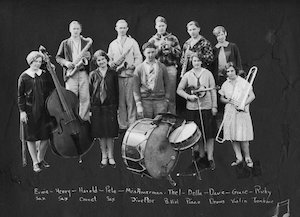
Photo: Mendocino High School Orchestra of 1928. Back row (L – R): Ernie Handelin, Henry Triplett, Harold Reep, Pete Lemos, Miss Amerman (Director) Front row: Thelma Silvia, Della Sumner, Dave Paoli, Grace Nichols, Ruby Carvalho. Photograph has been cut out and pasted onto a black paper background. From the reunion album, “A Backward Glance from 1898 – 1983” (Gift of Bertha Mason Estate)
March 23, 1927 – A Boys’ Potato Club was organized, and a potato-growing contest was announced. Officers of the club were: Francis Alfred Nichols, President; Henry Triplett, Vice-President; Harold Reep, Secretary; and Joseph August, Reporter. O. A. Hamblin, ranch manager of the Heeser Ranch, was the club advisor.
The club work was done under the supervision of the Farm Advisor’s office in Ukiah and sponsored by the Fort Bragg Farm Center. Twenty-five boys signed up at Apple Hall to participate in the competition. Each was tasked with cultivating a 1/4-acre (or less) plot and planting certified British Queen seed potatoes provided by Thomas Simpson, president of the Fort Bragg Farm Center. Mr. Simpson and his son had been raising potatoes and experimenting with new varieties for a number of years, and this variety was well-suited for the coastal area.
The Beacon reported on the prize, “The work will be competitive, and aside from the experience the boys will gain in producing and harvesting their crop, the boy who produces the best stand of potatoes will be rewarded with a trip to Davis during the State Fair period where he will meet boys from similar clubs from all over the State of California. He will also have an opportunity to spend considerable time at the State Fair.”
Inspections were conducted during the planting and harvesting periods. In June, Mr. R. D. Foote, assistant farm adviser from Ukiah, Mr. W. G. Waterhouse, State club leader from the University of California, and Mr. W. F. Poulson of the biological survey attended the potato club meeting. “Mr. Foote said he was well pleased with the way the boys potatoes looked. Mr. Foote and his associates inspected several potato patches in the vicinity and praised the good work of the club boys.” They were so pleased that they announced that the top three boys who won prizes for the best potatoes would attend the State Fair, with all expenses paid.
In September, the final inspections were completed, and the boys recorded their experience on their contest sheets and wrote an essay about what they had learned. “Very close competition existed, and only a few points separated the winners. The first award was made to Clarence Simpson and Harold Reep, who tied for first place. Ray Donoho came second with only one point behind the leaders.”
Shopping on Amazon? Donate to the Kelley House at no cost to you! Choose the Kelley House Museum at Amazon Smile and Amazon will donate a percentage of your purchases to the Kelley House!